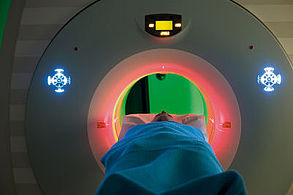Dutch Isotopes Valley
Approximately five hundred thousand nuclear medicine diagnoses and some five thousand treatments of serious diseases are performed annually in Dutch hospitals with medical (radio) isotopes. Due to the aging of the population, the demand for medical 'radioisotopes' for diagnostics and therapy is increasing every year. New developments in medical technology require more and new medical radioisotopes for the future in order to be able to continue offering tailored and affordable nuclear medicine diagnoses and treatments to the patient.
"Cancer patients start treatment sooner"
Dutch Isotopes Valley
Dutch Isotopes Valley (DIVA), the collaboration between URENCO, Delft University of Technology (TUDelft) and NRG aims to continue to provide patients with medical isotopes in the future, and in particular better medical isotopes for more accurate diagnoses and therapies for the treatment of more cancers. The three partners in DIVA cover the domain of the development and (reactor) production of medical isotopes, involving development work on precursors and (enriched) stable isotopes (URENCO), as well as research on irradiation conditions and necessary irradiation facilities (TUDelft), and the final (industrial) production and marketing (NRG) have been cast in a coherent context.

Worldwide unique combination of facilities and expertise
With the DIVA partners, the Netherlands has a globally unique combination of facilities and expertise that is needed to continue to provide for future development and production of medical isotopes. The high-quality precursors, so-called stable isotopes, of a number of important medical isotopes are only produced worldwide within a number of facilities. URENCO is the only western producer of these special materials. NRG is the operator of the High Flux Reactor which currently provides around 30% of the worldwide production of medical radioisotopes (molybdenum). Preparations are currently being made for the realization of the successor to the HFR, the Pallas reactor that will take over the role of the HFR from 2024 onwards. With the combination of scientific expertise and a nuclear research reactor, TUDelft, both nationally and internationally, makes an important contribution to fundamental and applied scientific research in the field of the development of medical isotopes and forms the link between the development and production of precursors and the ultimate production of new and / or improved medical isotopes. DIVA as an iconic project will mean a tremendous and rapid expansion of its name recognition worldwide, and will result in a rapid further growth of partners and buyers of knowledge and products in the field of medical radioisotopes.
Dutch Isotopes Valley
Three strong Dutch companies with their own specialty that together are globally responsible for many innovative improvements in the field of nuclear medicine.
Goals
In the coming 5-10 years, DIVA wants to have achieved that:
1. Delivery of lutetium-177 is guaranteed
Worldwide use is made of the lutetium-177 isotope in the treatment of specific tumors in internal organs. The demand for the isotope worldwide is expected to increase significantly. In order to be able to guarantee delivery to hospitals in the future, DIVA aims to introduce new types of lutetium generators to the market that provide for this and, moreover, produce the isotope considerably more cheaply.
2. The supply of molybdenum-99 is guaranteed
Technetium-99, the decay product of the radioactive molybdenum-99, is one of the most widely used isotopes in medical diagnostics. New techniques are being developed to make molybdenum-99 from the non-radioactive molybdenum 98 without the need for fission of enriched uranium. These new technologies will ensure increased security of supply of the medical isotope within the next 10 years and meet the increasing demand for the isotope.
3. Holmium-166 lactic acid globules are in production
An innovative treatment of liver cancer with lactic acid globules incorporating activated holmium-166 requires specific radiation conditions and irradiation facilities to be able to produce this new type of product. The irradiation of the holmium lactic acid globules is currently being carried out at the research reactor in Delft. In the context of DIVA, in collaboration with the Utrecht Medical Center, the production method for holmium-166 lactic acid globules will be developed to guarantee the delivery of the product in good quality.
Het Reactor Instituut Delft
Microspheres with holmium for treatment of liver cancer
4. The role of (trace) elements in age-related diseases can be investigated
In health issues, there is growing attention at the global level for the role of chemical (trace) elements in, among others, old-age diseases such as Alzheimer's and diabetes. Clinical analytical methods with the help of enriched stable isotopes are being developed in collaboration with the Meander Medical Center, which will enable the processes in the body in which these elements play a role to be monitored in 5-10 years and will help the doctor to make the correct diagnosis. and possible therapy.